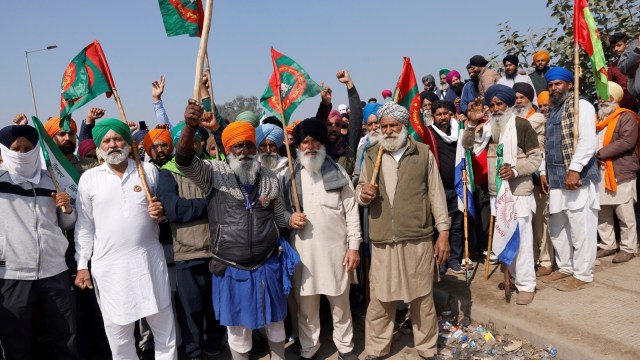Why farmers are protesting: Behind reluctant diversification in Punjab — and MSP law demand — a litany of loss
With no or minimal procurement by govt, farmers have been selling maize, millets, moong in market at rates below MSP
 Farmers are demanding
that both government and private
buyers should be legally
bound to pay them at least the
MSP on all crops. (Photo: Reuters)
Farmers are demanding
that both government and private
buyers should be legally
bound to pay them at least the
MSP on all crops. (Photo: Reuters)FROM PULSES such as moong and arhar (tur) to other diversification crops like maize, sunflower and bajra (millets), the farmers in Punjab have sold most of their produce to private traders in the past three years, and largely at the rates below the Minimum Support Price (MSP), indicates data accessed from the Punjab Mandi Board.
The farmers of Punjab are currently leading a protest, demanding a law from the Centre to ensure guaranteed MSP on 23 crops.
The Centre’s Commission for Agricultural Costs and Prices (CACP)declare sMSP on 23crops. However, in Punjab, only wheat and paddy are procured by government agencies on MSP. The other commodities are largely purchased by private traders, who are not legally bound to pay MSP. Farmers are demanding that both government and private buyers should be legally bound to pay them at least the MSP on all crops. The Mandi Board data largely answers why farmers in Punjab prefer to remain entangled in wheat-paddy cycle, and are reluctant to adopt other crops.
 However, in Punjab, only wheat and paddy are procured by government agencies on MSP.
However, in Punjab, only wheat and paddy are procured by government agencies on MSP.
Sample this: The maize, considered the most crucial crop to usher diversification in Punjab, was sold to private players for Rs 500-1,815 per quintal in 2021-22, while government had announced the MSP of Rs 1870 per quintal.
The next two years, farmers fetched a little more frommaize but even then there was huge variation in market rates—ranging from Rs 600 to 2495 per quintal in 2022-23 and from Rs 660 to 2,256 per quintal in 2023-24. The MSP was Rs 1962 per quintal in 2022-23 and and Rs 2,090 per quintal in 2023-24.
The markets in Punjab also recorded an uptick in maize arrival largely due to more area coming under water-guzzling spring variety of the crop, which is discouraged.
Meanwhile, Bajra too has been sold at the rates that are way less than the MSP — in 2023-24, it was procured by private players at Rs 1650 per quintal against the MSP of Rs 2500 per quintal.
The Centre, while negotiating with farmers’ leaders, had offered procurement of three pulses — arhar (tur), moongi and mash (urad), via government agencies at MSP. The offer, however, was rejected. The data shows that in past three years, handful of farmers who have been growing arhar, sold their produce to private traders at rates lower than the MSP. In 2021-22, the market rate for arhar was Rs 4920 per quintal against MSP of Rs 6300. In 2023-24,even as the MSP was hiked to Rs 7000 per quintal, the market rate for arhar hovered between
Rs 5,200-6000 per quintal.
Less than 1 per cent of total cultivable area in Punjab (42.16 lakh hectares) is under pulses. Farmers, however, had some solace in crops such as groundnut, sunflower and sarson (mustard) with the market prices for groundnut having remained mostly above MSP.
In 2022, the Aam Aadmi Party (AAP) government announced to procure summer moongi at MSP from farmers. However, over 90 per cent of the produce brought to mandis was purchased by private players, at rates below MSP. In 2022-23, nearly 4.62 lakh quintals of moong was purchased by private players, compared to 54,761 quintals by government agencies.
The MSP in 2022-23 was Rs 7,755 per quintal whereas the market rates hovered from Rs 2800 to 7275. In 2023-24, private traders purchased 5.55 lakh quintals of the crop as against government’s 20,252 quintals.
Against the MSP of Rs 8558 per quintal, farmers sold their produce for Rs 2,400 to 7,555 in the open market.
Private traders say there are several reasons why the government procurement and legalized MSP on all crops is a demand nearly impossible to fulfil.
Rajinder Arora, a trader from Rajpura, said that the government does not have adequate infrastructure to handle harvested maize. “Sometimes we have to purchase maize at rates lower than MSP as we have several other costs to bear. Farmers bring freshly harvested maize, which has high moisture content and it has to be dried first and then as per the quality, it is decided that it would be supplied to poultries, cattle sheds or crushed into flour for human consumption. The government announces MSP on dry maize, which doesn’t include all these extra costs that we incur at our own level. It is not possible to legalize MSP for private traders. A farmer picks the produce from the fields but then we get it cleaned, dried and packedfor end consumers,” said Arora.
Vinod Mittal, a moong trader from Jagraon of Ludhiana and the district president for Dal Mill Association said that even as the Punjab government had engaged its agency MARKFED to procure moong from farmers in past two years, most of the produce was picked by private players as the quality wasn’t up to the mark due to excessive rains.” The government will not buy a single grain if quality isn’t as per the specified standards and then if the private traders will also be forced to pay the MSP, then we will not buy at all. Why should we suffer losses,” he asked.
Another moong trader from Jagraon, Satpal Singh, said that the government cannot procure pulses and other crops as it lacks adequate infrastructure. “There are so many steps involved till produce is finally packed for factories. The current infrastructure is insufficient to handle it,” he said.
Punjab Arthiya Association president Ravinder Singh Cheema said that that primary reasons why the state government’splantoprocuremoongat MSP failed were lack of infrastructure, harsh quality parameters and farmers’ apprehension of delay in payments. “They decide to procure moong via cooperatives. Had they done it via arthiyas, it would have succeeded. In other states such as Rajasthan, the government procurement of crops fail due to poor infrastructure,” said Cheema.
Meanwhile, Harchand Singh Barsat, AAP leader and chairman, Punjab Mandi Board, blamed the quality of crop for MARKFED not procuring moong at MSP. “I was told that the produce brought by farmers did not match the required quality standards due to which it was mostly purchased by private players. For all those farmers who sold moong below MSP, the AAP government paid them ‘bhavantra’ amount (the difference between market rate and MSP) so that they don’t suffer losses. Rest all crops, except wheat and paddy, are purchased by private players in Punjab. The need of the hour is setting up agrobased industries in Punjab to promote diversification,” he said.













